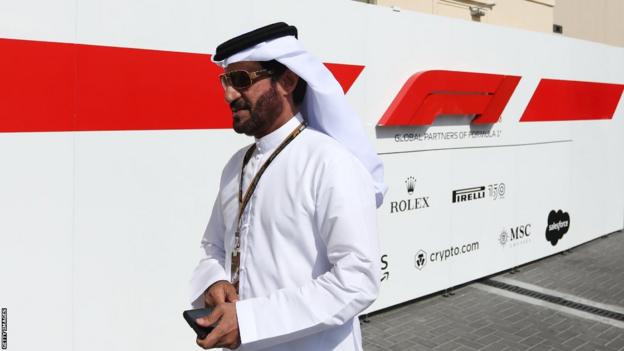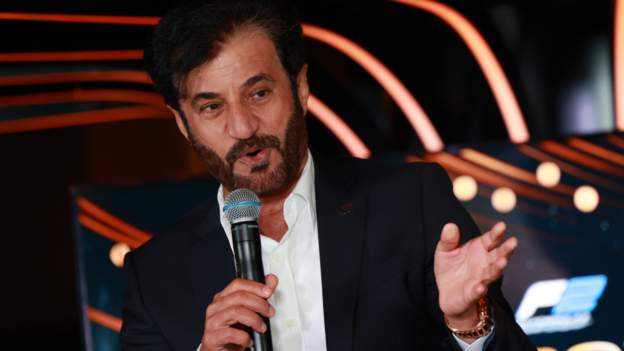
The silence in Formula 1 this week has been deafening.
A week after Mohammed Ben Sulayem, the president of the sport’s governing body the FIA, found himself embroiled in two separate controversies, there is widespread concern.
“Everyone thinks he’s got to go,” said one Formula 1 team boss, on condition of anonymity. “That is definitely the general view.”
The situations in which the 61-year-old Emirati found himself embroiled were the type of things that would typically force the resignation of a politician or a captain of industry.
Last week started with comments from Ben Sulayem on the value of F1 that the sport’s commercial rights holders, Liberty Media, described as “unacceptable”.
And it ended with the emergence of misogynistic remarks that were published 20 years ago on his own website, which can no longer be seen online, saying he does not “like women who think they are more intelligent than men, because they are not in truth”.
A spokesperson for the FIA said last week that those remarks “do not reflect the president’s beliefs” and defended his “strong record on promoting women and equality in sport”.
No F1 team has commented on the emergence of these historical sexist remarks, and no-one has been prepared to condemn Ben Sulayem’s behaviour publicly.
But one senior source told BBC Sport: “There has been widespread disgust.”
These are just the latest – and arguably most serious – of a series of controversies over the 13 months of Ben Sulayem’s presidency.
Last season, these included the imposition of a ban on driver jewellery, numerous failures of race management, Ben Sulayem blocking for six months the decision to increase the number of sprint race weekends for this season, and his release of the 2023 race calendar without telling F1 he was doing so.
They have kept coming.
First, there was a change to the rules that has been interpreted as an attempt to prevent the drivers from speaking out on potentially controversial issues.
Then the obvious disconnect between Ben Sulayem’s support for a prospective entry from the US-based Andretti team, compared to the lukewarm response of F1 and the outright hostility of some teams. In the latest development on this topic, a formal application process for prospective entrants was announced on Thursday.
But the valuation and sexism issues have raised concerns to a new level. In the words of the team boss, the Andretti issue was one of many “irritants”. The row over the sport’s valuation “definitely crossed over and could get the FIA into legal trouble”.
Money matters
The latest crisis surrounding Ben Sulayem was sparked by his response to a story on the website of financial experts Bloomberg that claimed Saudi Arabia’s Public Investment Fund – the same body that owns Premier League side Newcastle United – had tried and failed to buy F1 for $20bn.
Ben Sulayem did not contact F1 to check whether the story was accurate, according to sources, before he wrote on Twitter about an “alleged inflated price tag” and implied the FIA had a say in any potential sale.
F1 and its owners Liberty Media were furious and the chief legal officers of both companies issued what was essentially a “cease-and-desist” letter.
It said it was “wrong” to claim the FIA needed to be consulted on any sale and threatened to hold the FIA liable for any “damage to the shareholders and investors” or “regulatory consequences”.
Ben Sulayem’s remarks seem to be founded in a belief – as he expressed it last month – that “the championship is ours; we have only rented it out. So far there are only rumours about a possible sale. But the FIA should have a say and be able to offer advice.”
This is a reference to the so-called “100-year agreement” through which F1 – or Formula 1 Management, to give it its full name – leased the sport’s commercial rights for 100 years until 2110.
Around the time this deal was struck, the FIA entered into another arrangement, with the European Commission, that forced it to separate itself from all commercial matters with regard to the running of the sport.
Those two agreements remove the FIA from having any commercial input in F1. So there has been widespread disbelief at Ben Sulayem’s decision to express his opinion on a commercial matter.
His apparent contention that he can do so because ultimately the FIA owns the F1 world championship is regarded throughout the sport as misguided.
When the 100-year agreement was struck, then FIA president Max Mosley inserted what he called a “Don King clause” into the contracts, which gave the FIA a right to object to potential owners it considered inappropriate or unacceptable.
But that was before F1 was floated. Now, it is listed on the New York Stock Exchange. So any approval rights fall away. Shares – of any number – can be bought by anyone. That’s how stock markets work.
This was already foreseen in the 100-year agreement, which granted the FIA 1% of F1’s shares in the event of it being listed. But the FIA has no control over the buying or selling of the company.
‘He should be back-pedalling and apologising’
The fact the historical sexist remarks by Ben Sulayem emerged just three days after the controversy over the value of F1 has not gone without comment on social media, with some expressing the view that the timing was convenient to say the least.
Be that as it may, Ben Sulayem has not denied the comments are genuine, nor issued any personal public statement on them at all. This week, the FIA reiterated its initial statement and refused to be drawn into questions as to whether the comments were reflective of his views at the time and why they might have changed.
The existence of his former website and the fact it contained misogynistic remarks was widely known in F1 circles even before he was elected FIA president in December 2021.
The question moving forwards is what happens now they have finally emerged into the public domain.
“Those kind of comments bring down CEOs every day,” one senior figure said.
“What he really should be doing is back-pedalling and apologising. ‘I made those comments 21 years ago. I regret them,’ … whatever he wants to say.”
BBC Sport asked MotorsportUK, the country’s representative at the FIA, for a response and whether it still had confidence in Ben Sulayem as president.
A spokesperson said: “Motorsport should be an environment where everyone can participate, spectate, or volunteer their time in an inclusive environment that is safe, fair and fun.
“There is a great deal more to be done in changing the culture within the sport to ensure that motorsport is more representative of society’s demographics and champions best behaviours. For any queries or comments on the FIA, please speak directly to their media office.”
Freedom of speech
These two controversies come on the heels of another – the insertion into the FIA sporting code of a clause that prohibits the “making and display of political, religious and personal statements” without the prior written permission of the FIA.
The past three F1 seasons have been marked by drivers such as Lewis Hamilton and Sebastian Vettel raising awareness of issues such as racism, diversity and LGBTQ+ rights, and F1 itself has also launched campaigns addressing issues of equality.
The widespread impression of the new clause is that Ben Sulayem is trying to silence the drivers. Not least because in his very first interview as president last May he implied that he was against drivers speaking out on such issues.
“Vettel drives a rainbow bicycle,” he said, “Lewis is passionate about human rights and [Lando] Norris addresses mental health.
“Everybody has the right to think. To me, it is about deciding whether we should impose our beliefs in something over the sport all the time. I am from an Arabian culture. I am international and Muslim. I do not impose my beliefs on other people. No way! Never.”
The statement issued when the clause was introduced said it was “to enable the FIA to align itself to the practices of other similar international sports organisations such as Fifa and the IOC”.
But the clause in the Olympic Charter covering this issue explicitly limits restrictions on the “demonstrations or political, religious or racial propaganda” to “any Olympic sites, venues or other areas”.
The FIA’s clause contains no such exclusions. So, some legal experts say, in theory Hamilton could write a social media post promoting human rights from his homes in Monaco or Colorado and be in danger of losing his racing licence.
Nor is it clear how the clause complies with the European Convention on Human Rights, article 10 of which guarantees freedom of expression. France and Switzerland – where the FIA has its bases – are both signatories.
This week, Alfa Romeo’s Valtteri Bottas became the first driver to speak out on this issue
He told Sweden’s Express newspaper: “Formula 1 has done a good job of bringing attention to some of these types of issues and many drivers have raised their voices, including Sebastian.
“I don’t understand why they want to control us. I think we should have the right to talk about what we want. That’s how I see it, but we’ll see what happens.”
The FIA says further information on the meaning, intention and limitations of the new clause will be issued in the near future.
What happens next?
One insider said this week, referring to the lack of any communication from Ben Sulayem: “What will be interesting will be does he change his game at all? If he makes one more mis-step, I don’t know how he survives.”
But the fact that many senior figures in F1 have concerns about Ben Sulayem is not necessarily a threat to this presidency.
F1 teams – and F1 itself – have no power over an FIA president, whose authority comes from support from the member clubs who elected him.
Even then, it is not clear in the FIA statutes what mechanisms there may be for removing a sitting president.
There are whispers this week, for example, that there is a move from some member clubs and within F1 to create a vote of no confidence in Ben Sulayem.
But the FIA statutes make no mention of such a process, even if the Senate is empowered to “study any question that might arise as a result of unforeseen factors” and the World Council “may resolve any difficulties not governed by the present regulations which might arise during any meeting”.
On the F1 front, there is a meeting of the F1 Commission – a rule-making body comprised of the FIA, F1 and the teams – scheduled for 21 February, the beginning of the week that ends with the sport’s pre-season test in Bahrain.
This, one insider suspects, “is going to be pretty interesting – even the dynamic between [F1 president] Stefano [Domenicali] and Mohammed.
“I get the sense they will come in not aligned.”


